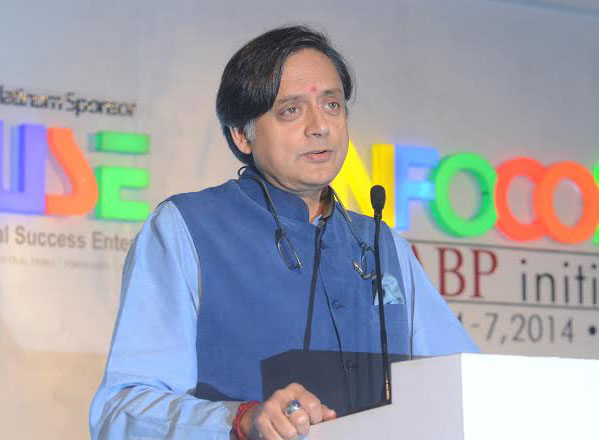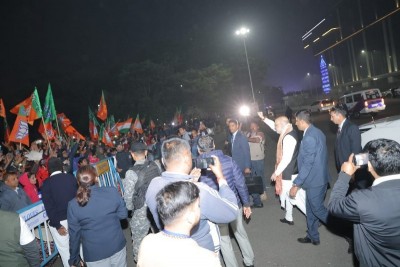December 29, 2025 10:42 pm (IST)

Congress MP Shashi Tharoor petitions online to repeal IPC 377
New Delhi, Feb 8 (Just Earth News/IBNS) Congress Member of Parliament in Lok Sabha, Shashi Tharoor, has begun an online petition on change.org in the backdrop of a recent Supreme Court move, to mobilize support in favour of repealing the controversial IPC 377 that criminalizes gay sex in India.
In his petition, Tharoor, who is a strong advocate of sexual minority rights, said the opportunity of the Supreme Court decision to reconsider the constitutionality of Section 377 of Indian Penal Code (IPC) should be used to urge the Prime Minister to amend the controversial law.
"A curative petition was filed in the Supreme Court to challenge an earlier verdict that upheld Section 377. The Supreme Court has referred the petition to a five-judge bench. Let us take this opportunity to send out a strong message to the Hon'ble Prime Minister that we want to amend Section 377," he said in the petition that is now being signed by thousands electronically on change.org.
"Every Indian has a right to privacy, equality, and protection from discrimination," the petition says.
Offering hope for the LGBT community in India, the Supreme Court on Tuesday last referred to a five-judge bench on whether to admit a curative petition which is seeking to reconsider the validity of controversial section 377 of the Indian Penal Code (IPC) concerning homosexuality and its criminalisation.
The activists from human rights groups and LGBT community demanding scrapping of the controversial section of the IPC called the court move a progressive step.
The petition thus has not been dismissed yet by the Supreme Court, neither it issued any notice to the government, leaving hope for the rights groups.
The section 377 criminalises consensual sexual activities of Lesbian, Gay, Bi-sexual and Transgender (LGBT) adults in private.
Chapter XVI, Section 377 of the IPC dates back to 1860 introduced during the British rule of India, and it criminalises sexual activities "against the order of nature", arguably including homosexual acts.
According to it, Unnatural offences means: "Whoever voluntarily has carnal intercourse against the order of nature with any man, woman or animal shall be punished with imprisonment for life, or with imprisonment of either description for term which may extend to ten years, and shall also be liable to fine."
An apex court bench headed by chief justice TS Thakur heard the curative petition.
Chief Justice Thakur reportedly told advocate Anand Grover representing petitioner Naz Foundation, that the new bench would conduct a comprehensive hearing of the arguments for the protection of the dignity and rights of the LGBT people.
The Supreme Court on Dec 11, 2013 had set aside a landmark pro-LGBT judgement of Delhi High Court in 2009, by ruling that homosexuality would continue to remain illegal in the country and would not be constitutionally invalid.
The Delhi High Court verdict of July 2009 had not been challenged by the Government of India and since then it was like a law in India. But the SC verdict changed all that and gay sex again became illegal in India.
The Supreme Court in 2014 also had rejected a petition filed by the Centre seeking a review against its 2013 verdict that criminalized gay sex.
The Delhi High Court verdict of July 2009 had not been challenged by the Government of India and since then it was like a law in India. But the SC verdict changed all that and gay sex again became illegal in India.
The Supreme Court in 2014 also had rejected a petition filed by the Centre seeking a review against its 2013 verdict that criminalized gay sex.
Hence the last move of the Supreme Court is seen as a progressive step forward by all groups supporting the LGBT community.
Section 377 has been used by the police and other groups to harass homosexuals.
www.justearthnews.com/IBNS
Section 377 has been used by the police and other groups to harass homosexuals.
www.justearthnews.com/IBNS
Support Our Journalism
We cannot do without you.. your contribution supports unbiased journalism
IBNS is not driven by any ism- not wokeism, not racism, not skewed secularism, not hyper right-wing or left liberal ideals, nor by any hardline religious beliefs or hyper nationalism. We want to serve you good old objective news, as they are. We do not judge or preach. We let people decide for themselves. We only try to present factual and well-sourced news.
Support objective journalism for a small contribution.
Latest Headlines
India rejects Pakistan’s Christmas vandalism remarks, cites its ‘abysmal’ minority record
Mon, Dec 29 2025
UP horror: Retired railway officer tortured to death, disabled daughter starved for 5 years by caretakers
Mon, Dec 29 2025
Big defence push! Rajnath Singh-led council clears Rs. 79,000 crore for Armed Forces
Mon, Dec 29 2025
Cigarettes may cost four times more as parliament clears major excise duty overhaul
Mon, Dec 29 2025
Supreme Court puts Aravalli redefinition on hold amid uproar, awaits new expert committee
Mon, Dec 29 2025
Supreme Court strikes! Kuldeep Sengar’s bail in Unnao case suspended amid public outcry
Mon, Dec 29 2025
From bitter split to big reunion! Pawars join hands again for high-stakes civic battle
Mon, Dec 29 2025







